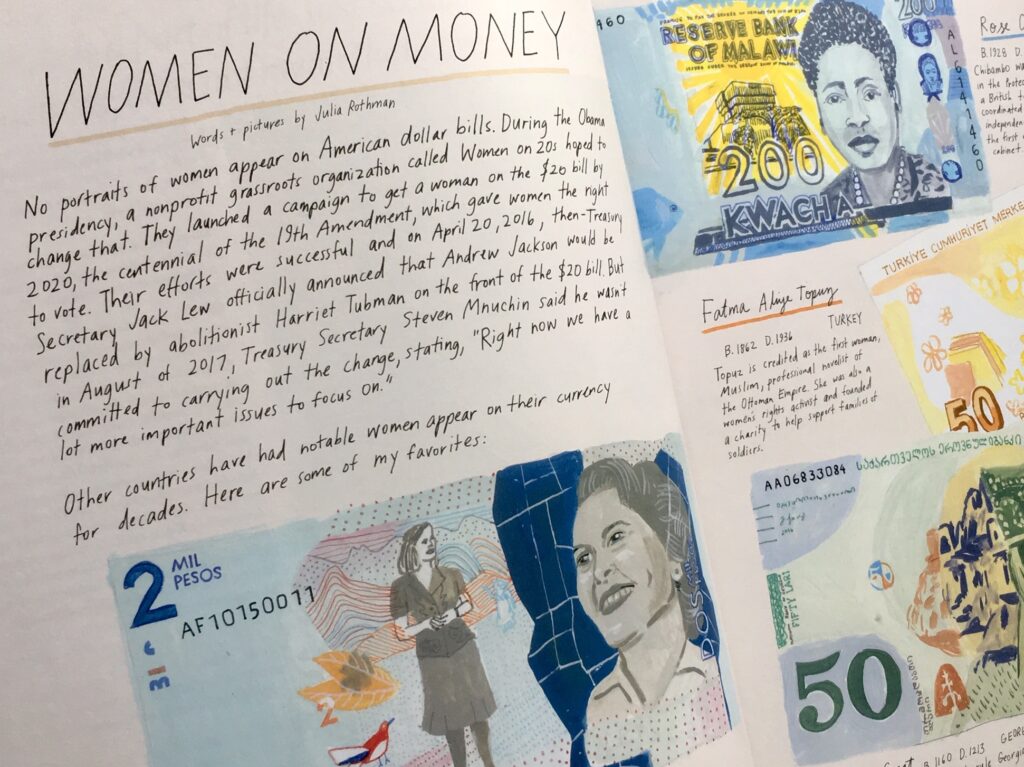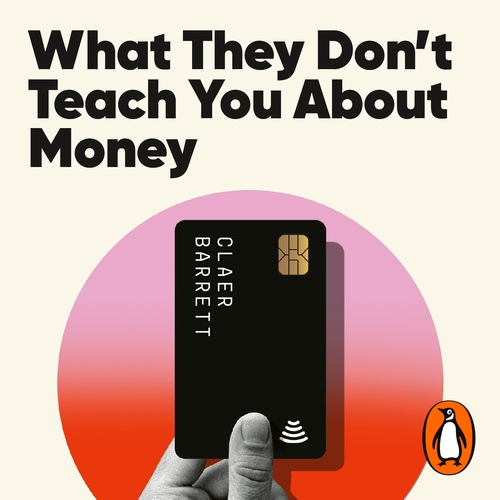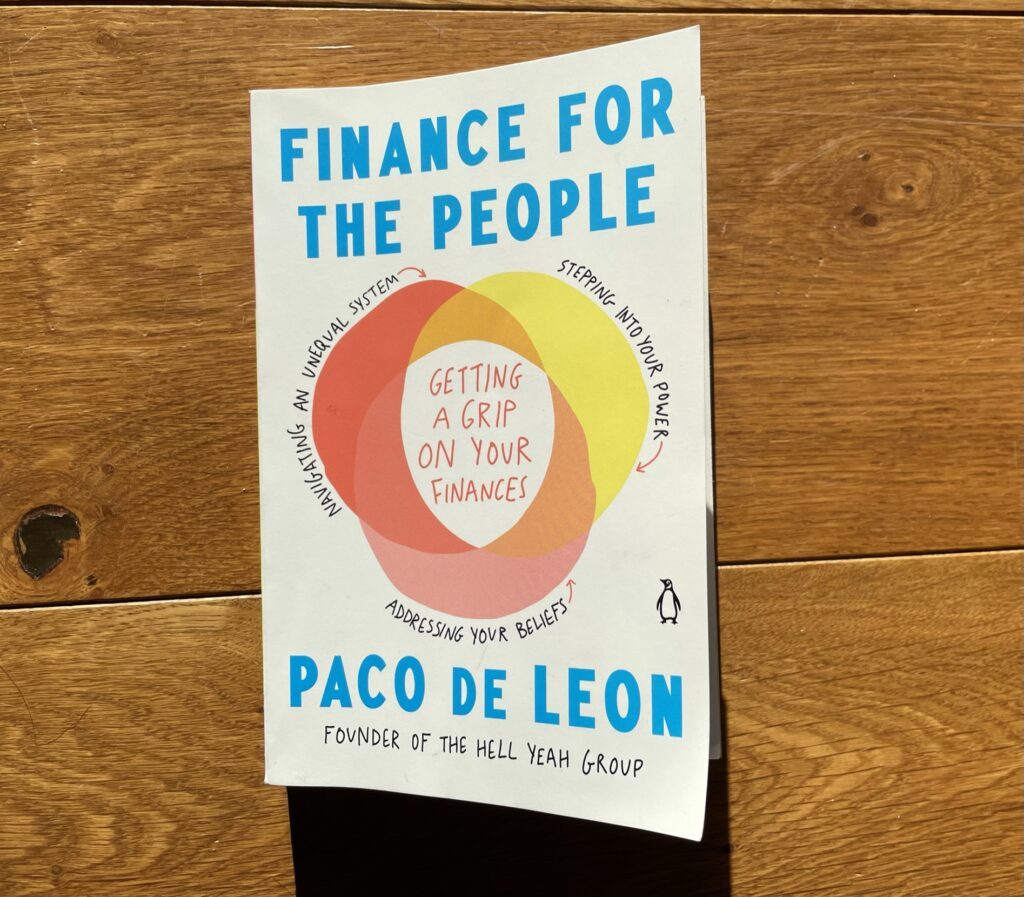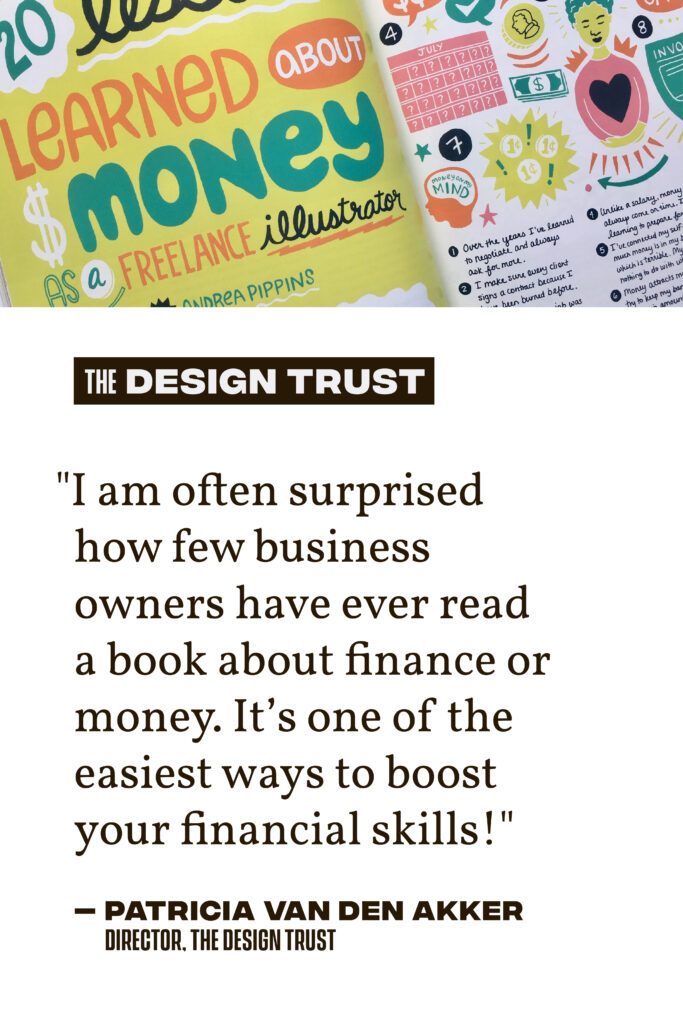Are you scared of money and finance, costing and pricing your work? Many creatives are! But the reality is that if you want to start and run a successful creative business then you need to face the money facts and somehow learn those financial skills.
I am often surprised how few creatives have ever read a book about finance or money.
While it’s one of the easiest and cheapest ways to boost your financial skills!
In 2019, The Design Trust organised a special month-long #FebFinance challenge around finance and money, which started with daring creatives to read at least one of our recommended finance and money books for creatives that month – and it was a huge success with 100’s of creatives joining in, commenting and getting excited about money and finance! Yes, reading a book can be very inspiring and life-changing even. We continue to have finance as our February topic every year in our Business Club.
So, if you thought that there are very few finance and money books for creatives available, then check out our favourite ones here.
We would love to hear from you in the comments if we have inspired you to read one of them!

Book 1: Overcoming Underearning – Barbara Stanny
This is one of my most recommended books for creatives, and many creatives have told me how life changing this book has been for them too.
Barbara is an American journalist who was born into a rich family and then married. Unfortunately, her husband gambled all the inheritance away so she had to get herself a job (and a divorce!). She decided to interview professional American women who earn more than $100,000 to see what they do and how they think differently. This book is the result.
Overcoming Underearning is a great book if you are a chronic ‘under-earner’… somebody who finds it hard to stand up for themselves, who is very likely a people-pleaser, and finds it difficult to talk about money, let alone negotiate a better deal or ask for more.
By the way being an under-earner has got nothing to do with the amount you earn, but that you are earning less than you want or need to earn.
It’s a fairly quick read (less than 2 hours so no excuses there!) but it’s a very powerful book … asking poignant questions about your thoughts and behaviour around valuing yourself and your work. It will make you conscious of what’s going on, so be warned that this book can have a strong emotional impact.
But it could really resolve some of the major underlying issues you might have about undercharging for what you are worth.
It’s aimed at women in particular, but I think many creative male practitioners might find this challenging book useful too.
Book 2: Profit First – Mike Michalowicz
You probably know that sales – expenditure = profit.
But what happens if you turn that equation around? Sales – Profit = Expenditure.
In Profit First Mike Michalowicz explains that most people have this contradictory habit called Parkinson’s Law: “The demand for something expands to match its supply.” Or basically we spend what we get.
Do you spend in line with what you earn?
And when your sales go up … what happens then?
Do you spend more to invest or ‘because you are worth it’? And therefore never make a profit?
Indeed, that’s what many business owners do! When we get more sales then we also increase our spending!
And as we often pay ourselves from our profits, we often end up earning very little because we first spend on the business before rewarding ourselves ….
Sound familiar?
Michael argues in this book that we should first set a limit to what we spend on ourselves (e.g. our ‘drawings’) as part of our business expenses, by allocating a specific % of money to pay ourselves first! So, pay yourself first and then limit your other expenses. Sounds good, doesn’t it?
Profit First is a very insightful book that will help you to minimise your expenditure and ‘tame your cash-eating monster’.
Mike shares some really great ideas of how to manage your money better, assessing the financial health of your business, minimising your expenses and debt and starting to pay yourself a higher salary.
You can read the book in about 4 hours, but the ideas and systems Mike shares can have a major impact if you decide to implement his suggested systems of different buckets. Even if you don’t follow all his rules to the letter, but simply allocate your income immediately into pots for salary, savings and expenses, this book will help you to mange your money better.

BOOK 3: What they Don’t TEach you about money – Claer Barrett
This is a brilliant personal finance book written by the FT’s personal finance expert Claer Barrett. It is clearly written and easy to understand because it avoids confusing money jargon. What They Don’t Teach You About Money covers everything from our emotions around money to investing, pensions, mortgages, credit cards and student loans. It helps you understand how borrowing money works (and how expensive it really is), how to get into good money practices and how to think ahead – even just a little bit – to plan for the future.
A fantastic book to help get your own finances in order so that you are set up well for your business finances too!
Book 4: How to Become a Money Magnet – Marie-Claire Carlyle
Are you sabotaging your chances to attract more money?
This is a very thought-provoking and practical book, full of questions, quizzes and exercises to challenge your attitudes and thoughts around money, being worth it, and how to break the pattern to become ‘richer’ in your life and business.
How to Become a Money Magnet is a joyful and insightful read that you can dip in and out of regularly, with lots of checklists and case studies. You will get much more out of this book if you decide not just to read the book, but actually DO it.
Book 5: No B.S. Marketing to the Affluent: No Holds Barred, Take No Prisoners, Guide to Getting Really Rich – Dan S. Kennedy
I read this book a few years ago and I really had a love-hate relationship with it! (It doesn’t help that the author is close friends with and a big fan of Mr. Trump, and I don’t really believe books with titles that tell you that you will get really rich!). I have to say that I sometimes screamed at this book and squirmed too.
But, it’s actually really insightful, and if you want to sell to rich people then I do recommend this book to you.
Plus, I personally think it’s a good idea to sometimes read a book that you might not agree with. This book will definitely expand your mind and your approach to selling to ‘rich’ people.
The start of the No B.S. Marketing to the Affluent is really useful as he shares marketing data and insights of who rich people are (pointing out the huge differences between a self-made New Money man or someone who inherited money. Between somebody earning say $250K a year and someone earning $10million. Between an older business family man – often with two families (haha) – and a gay couple in Manhattan!), and how they spend their money, and how they want to be treated. Yes, most rich people are optimists, but don’t believe the myths that they are confident!
The second part of the book is about what they spend their money on, which goes into great detail on what kind of products and services they are interested in, the importance of niches and being the best, and the motivations behind their purchases. And the last part of the book goes into how to market and sell to them, the customer service required, the networking and schmoozing.
This is a long, detailed, and very well researched book, with very specific marketing advice if you want to sell to rich people. It’s not a quick fix book to get rich. (Which is a good thing in my opinion.)
Book 6: Think & Grow Rich – Napoleon Hill
This is a finance success classic. It’s unbelievable but this book was first published in 1937.
And what is truly amazing is how relevant it still is today!
Napoleon Hill researched the habits and mindsets of hundreds of tycoons in the USA for over twenty years at the start of the previous century to write this classic on how to become financially successful.
You’ll realise that there have been recessions before and that people dealt with it.
That the struggles we have today around money and success are much more universal, and have very little to do with our current financial, political, economic or internet/technology age.
Think and Grow Rich is a classic self-help book on how to get rich and successful, beyond today’s financial struggles and the interference of social media and the internet (the telephone even barely existed when he wrote this book!).
Timeless lessons from the white men in charge from a century ago are still surprisingly relevant today.
Book 7: Motivations for Creative People – Mark McGuinness
Although this doesn’t sound like a finance and money book for creatives, it definitely is. Mark McGuinness is one of my favourite creative business coaches and when he launched Motivation for Creative People I was frankly a little surprised: “Surely creatives have no problems with motivation?”
But what’s really good about this book is that it covers all of our motivations as creatives, and how they often conflict with each other. Especially the ‘creative’ versus ‘money’ motivation!
If you struggle in your head to make a living from what you love doing, and find it hard to charge properly for your work, then this is a great book to help you. Mark is a poet himself too, and he explains the external and internal motivations (‘the rewards and the joys of work’), how they work together but also conflict, and how you can create a business model that works for your creative business or career in line with your values and goals.
You can read an extensive book review of Mark’s book here.
Book 8: Go Fund Yourself – Alice Tapper
This personal finance book is written by a fun loving, British, twenty-something economist, with a good social media profile, and it was recently recommended to me by a millennial (Thanks. You know who you are!).
This book covers the basics of how to manage your money better while dealing with the challenges, insecurities and opportunities of the 21st century. Stuff that we probably should have learnt at school, but we were never taught budgeting skills, mortgage rates or basic investment. Plus let’s be frank: nobody really likes to talk about money, and most of us don’t really know what to do. This book fills that gap.
It’s a really practical and honest book to help you get out of debt, spend smarter and more in line with your own values, get an emergency fund together, get your pension sorted, and even invest. Plus it has got a special chapter about money in business – although it’s a little basic, it gives an introduction to financial terminology, how to start doing your accounts and deal with tax.
But what I love about Go Fund Yourself is that it’s also about the bigger and more inspirational picture around money, and what your financial dreams, values and aspirations are. How to change your money mindset. How to make choices from all the different options. It has a healthy dose of scepticism when it comes to ‘wealth’ and will help you to make a more conscious effort to your financial realities (whatever your age!).

Book 9: FINANCE FOR THE PEOPLE – Paco de Leon
This is a wonderful, plain speaking, easy to understand personal finance book that delves into our emotions and habits around money and how we can change them.
Finance for the People asks the reader to look at their beliefs and experiences around money and then offers practical exercises to help shift the mindset with realistic mindfulness activities too.
The book has more than 50 fun illustrations and diagrams to make the concepts accessible. It’s the kind of book we should all read in our twenties to help us not be frightened of money, to help us learn about saving, investing and pensions and to bring in good finance ‘habits’ early.
A fantastic book for people who are not sure where to start when it comes to reading about money!
Book 10: Worth It – Amanda Steinberg
This book is written by the American independent investment adviser Amanda Steinberg who ran the very successful DailyWorth website, and who was on a mission to get more women interested in money and investment. The first part of the book is all around what you are worth, what stories you have been telling yourself around money, and how to hit the reset button.
Worth It is an inspirational read about money and how you can create the life you want to live. Some of the advice is very much aimed at the American market, and might not be so useful for a British or European audience, but overall her approach travels well. From a British perspective it’s interesting to read her questions around investing in a property, as she personally has been bitten badly and lost her own house in the past and is therefore a strong advocate for renting.
Book 11: Stop Thinking Like A Freelancer – Liam Veitch
Freelancing is tough financially.
Liam used to be a struggling creative freelancer but created a very successful £1 million+ web business and in this fairly quick book (3 hour read) he explains how he did it. How he managed to attract enough of his dream clients, build exposure, and created more predictable income streams. Of course in the process he stopped being a solopreneur and became a ‘proper’ web agency with a team. And that’s of course not what every freelancer is looking for.
But Liam has got some good points around the small-minded-thinking that many freelancers often have and that can stop them from being more successful.
- That they don’t think of themselves as businesses.
- That they need to start thinking bigger.
- That they need to have clearer financial and business goals.
- That they need to throw out the non-and-low-paying clients and aim for better and more reliable clients.
- They they have to start differentiating themselves from the competition.
Stop Thinking Like a Freelancer is a great read for any creative freelancer who wants to up their game and become more professional.
This isn’t a pure finance and money book for creatives, but one that will expand your thinking, make you more strategic and give you loads of marketing and development tips.

Did you find our recommended finance and money books for creatives inspiring? Did you purchase and read one of these books? We would love to hear from you in the comments. Share with us which finance and money book for creatives you selected and why. And let us know what you learnt, so that you can inspire other creatives to read these books too!
Please note that we have included some affiliate links to Amazon in the blog post above, as many of our readers like the convenience of this online retailer. However, we would love you to order any of these books from your own local book shop!
Share your questions and comments